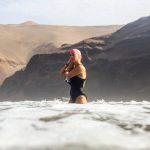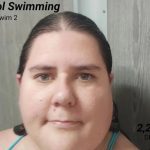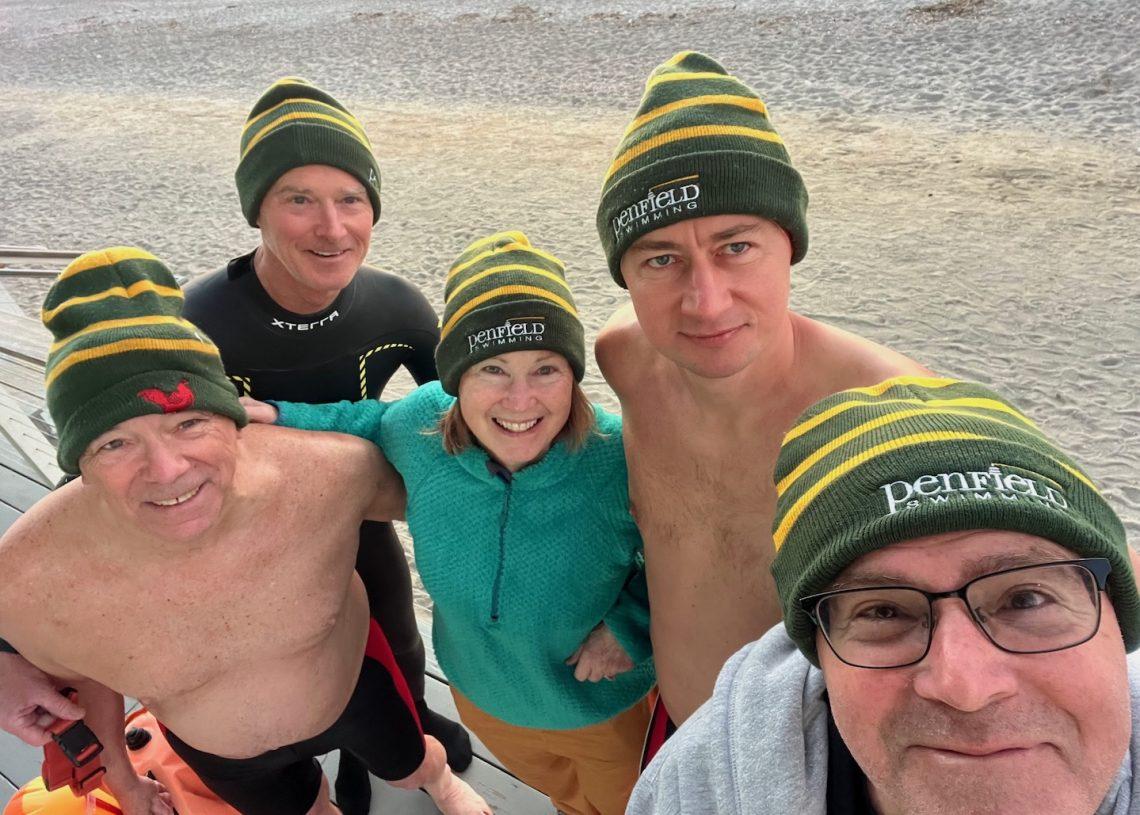
“Swimming has been my lifesaver”
Derek Yach kept swimming while receiving treatment for cancer – he shares his incredible story with us
I have swum my whole life. It started in pools in Cape Town and led to years of following the black lines, building friendships, being soaked in chlorine, enjoying the thrill of competitions and the milkshakes that followed. I migrated to open water during medical school in Cape Town. I was a lifesaver on Clifton, one of the most beautiful beaches in the world, and started swimming longer distances. First around our bay, then and under the direction of my wife to be, Yasmin, my first Robben Island crossing (about 10km from the Cape Town shore). Many more followed including the first double between Three Anchor Bay and the Island in Cape Town accompanied by dolphins and threatened by Great Whites.
The views of Table Mountain, the pull of currents, the fresh cool waters (usually about 55 degrees Farenheit) and the mere challenge of finishing kept me seeking more. The English Channel, many open water swims in Europe followed before moving to the US.
We settled in the town of Fairfield on the Long Island Sound, where almost daily swims in the Sound became my morning routine. Usually with a great group of friends. Our Sound swims intensified during the pandemic when indoor pools closed, and we agreed to keep going through the winter even as temperatures dropped into the 30s. Sans wetsuits we built our rituals to get warm fast on exiting and then enjoy the hours of euphoria that followed.
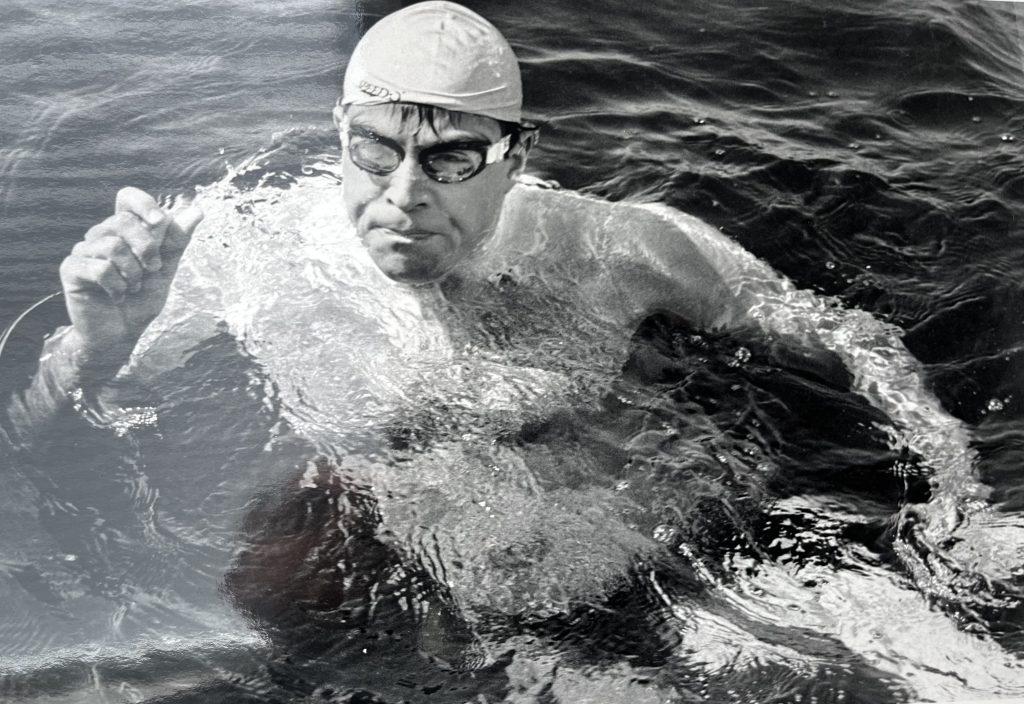
We swim at dawn at Penfield Beach and try to start just before the sun rises to soak in the sun’s wake, the gentle sounds of waves, the ever-present gleaming white egrets, and screaming seagulls. I cannot help but feel awe, gratitude and joy during those early morning swims. Imagine my shock when having been diagnosed five months ago with esophageal cancer (thankfully early stage) I was told I may never swim again, starting with the onset of my four months of chemoradiotherapy. I stoically prepared myself for this by having my last pool swim at our local YMCA and then two “last” Sound swims, the first with my accomplished and inspiring swim friend Jim Bayles and then with Yasmin watching.
Chemotherapy started. It included Oxaliplatin which is known to induce severe cold sensitivity and peripheral neuropathy and the usual nausea and exhaustion. After the first infusion I immediately experienced the cold sensitivity. I could not open the fridge, needed gloves to hold cold items, got severe cold “prickles” in my hands and feet once I stepped outside, could not eat or drink anything cold, and developed “first bite” symptoms with any food, which sent searing pain down the sides of my mouth.
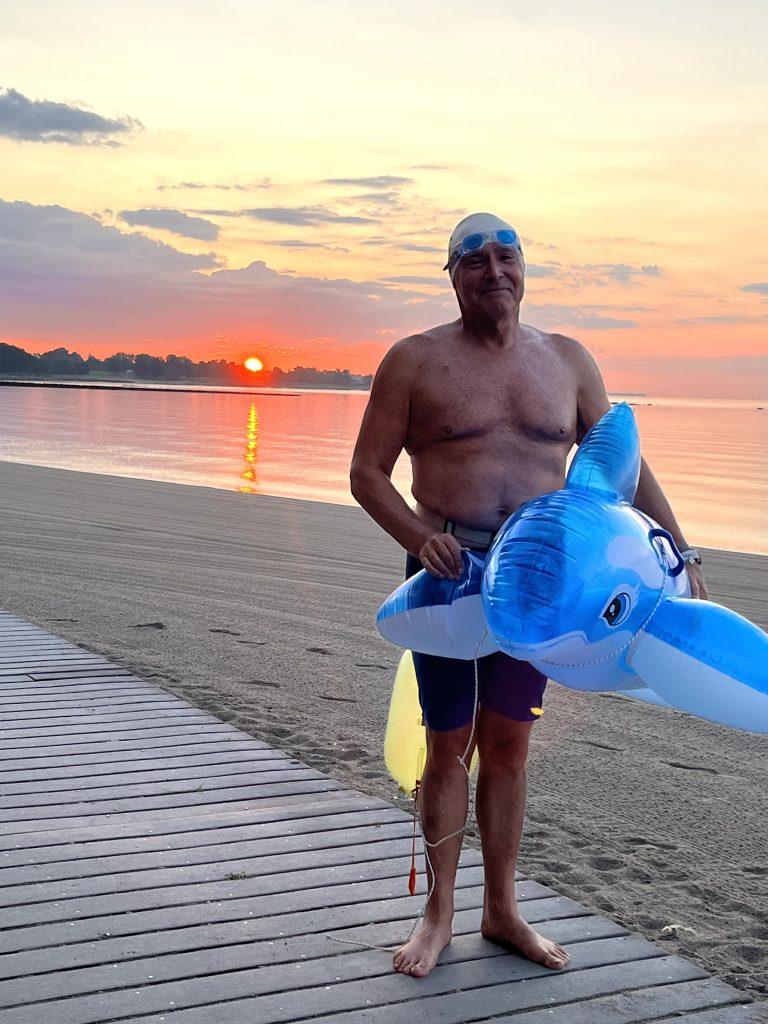
On day three I asked again why I could not swim. Fear of infection seemed the only real concern. We agreed to watch for this and closely monitor my blood status. So, I started swimming again in the YMCA and within a few days, with the cold sensitivity subsiding, returned to the Sound and our exquisite waters of Sherwood State Park. And kept going. With radiotherapy now completed and a week of chemotherapy to go, I have clocked over 300km on my Garmin between the Sound and the YMCA. In addition, I’ve been doing over 10,000 steps daily for four months.
On the days I got infusions and could not swim, I walked the beach early in the morning, watching my swim friends, Jim, Chris, Keith and Markus as they glided across the bay. The sunrises seemed more perfect, the egrets more plentiful, and the chance to save a few lives of stranded horseshoe crabs felt like a blessing. There were days when the combination of the red sunrise (thanks to Canadian smoke!) and the silky greyblue surface of the water led me to feel what is described in Genesis 1: “and the spirit of God was hovering on the waters”. It left me with a sense of deep peace and gratitude.
The days turned into weeks and then months. The dreaded symptoms were modest. No nausea severe enough to warrant taking one of the pills from boxes of medications I had been prescribed. I learned to live with the cold sensitivity and adjust my diet accordingly. Some peripheral neuropathy lingered and still does, but not enough to affect my daily activities. I have felt slightly more tired and enjoy a daily nap, but overall feel that swimming has been a real lifesaver. The physical act of swimming, the deep immersion in open waters, and most importantly the support and camaraderie of fellow swimmers have all helped me get through what many patients describe with pain, exhaustion and depression.
I still have a long road ahead – including surgery – and know that for many people swimming is not an option. But what I have learned is that physical activity has many benefits for those on cancer treatment. This is backed by years of substantive epidemiological research focused on several cancers. Physical activity reduces the severity of chemotherapy and radiotherapy side effects and contributes to improved survival. These benefits being in addition to better mental health and wellbeing.
My advice to people facing similar challenges is to stay active and try swimming: your life may depend upon it! Special thanks to my core Penfield swimming friends: Jim Bayles, Chris Spearing, Markus Marty, Cathy Lozier, Ellen Finnegan and Keith Kirkpatrick; my oncology team led by Drs Du and Persico at Yale Smilow Cancer Center; and my wife, Yasmin von Schirnding for their exceptional constant support.
Read more inspiring readers’ swim stories.






